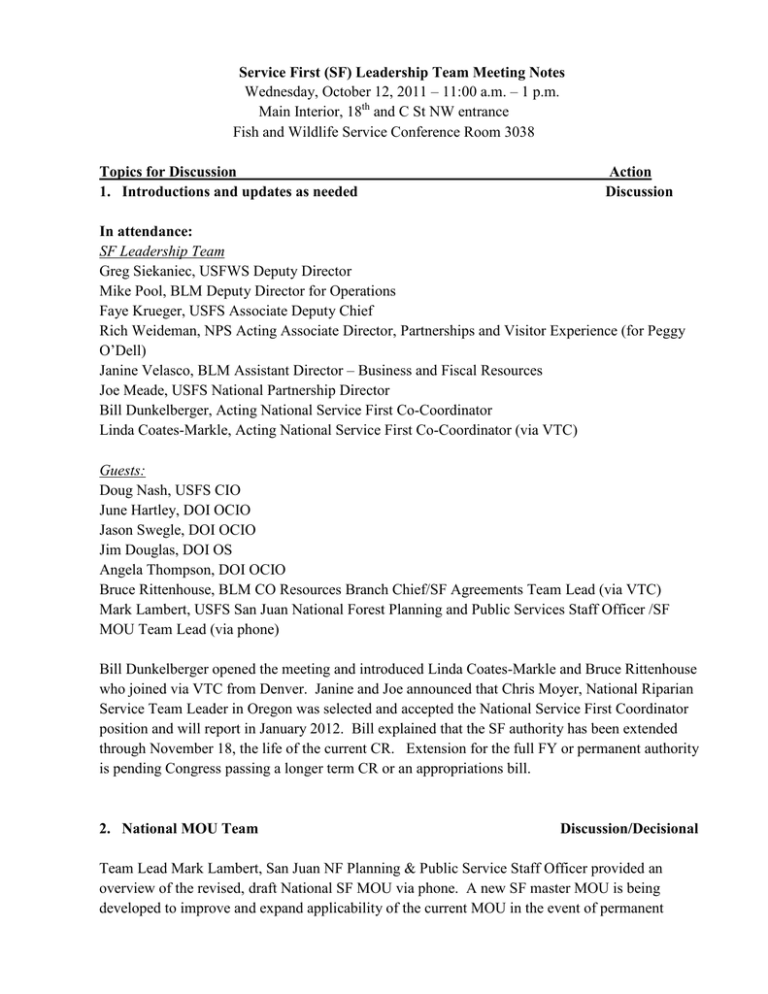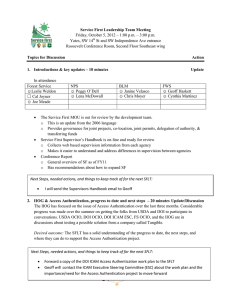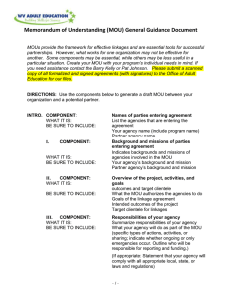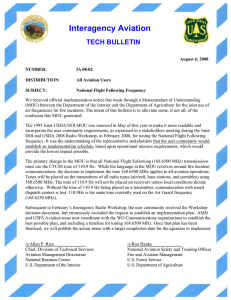Service First (SF) Leadership Team Meeting Notes Topics for Discussion Action
advertisement

Service First (SF) Leadership Team Meeting Notes Wednesday, October 12, 2011 – 11:00 a.m. – 1 p.m. Main Interior, 18th and C St NW entrance Fish and Wildlife Service Conference Room 3038 Topics for Discussion 1. Introductions and updates as needed Action Discussion In attendance: SF Leadership Team Greg Siekaniec, USFWS Deputy Director Mike Pool, BLM Deputy Director for Operations Faye Krueger, USFS Associate Deputy Chief Rich Weideman, NPS Acting Associate Director, Partnerships and Visitor Experience (for Peggy O’Dell) Janine Velasco, BLM Assistant Director – Business and Fiscal Resources Joe Meade, USFS National Partnership Director Bill Dunkelberger, Acting National Service First Co-Coordinator Linda Coates-Markle, Acting National Service First Co-Coordinator (via VTC) Guests: Doug Nash, USFS CIO June Hartley, DOI OCIO Jason Swegle, DOI OCIO Jim Douglas, DOI OS Angela Thompson, DOI OCIO Bruce Rittenhouse, BLM CO Resources Branch Chief/SF Agreements Team Lead (via VTC) Mark Lambert, USFS San Juan National Forest Planning and Public Services Staff Officer /SF MOU Team Lead (via phone) Bill Dunkelberger opened the meeting and introduced Linda Coates-Markle and Bruce Rittenhouse who joined via VTC from Denver. Janine and Joe announced that Chris Moyer, National Riparian Service Team Leader in Oregon was selected and accepted the National Service First Coordinator position and will report in January 2012. Bill explained that the SF authority has been extended through November 18, the life of the current CR. Extension for the full FY or permanent authority is pending Congress passing a longer term CR or an appropriations bill. 2. National MOU Team Discussion/Decisional Team Lead Mark Lambert, San Juan NF Planning & Public Service Staff Officer provided an overview of the revised, draft National SF MOU via phone. A new SF master MOU is being developed to improve and expand applicability of the current MOU in the event of permanent authority. The current MOU focuses mostly on interagency agreements and funds transfers. The new MOU will include guidance on use of all the elements of the authority – cross delegation, colocation, working on behalf of another agency, and funds transfers. Mark noted that the MOU cannot be finalized until the proposed, master national SF agreements have been finalized since guidance for using these new instruments will be included in the MOU. Mark estimated that a draft MOU could be provided to the team to review by 11/30/11. 3. Agreements Working Group Discussion/Decisional Follow-up from SFLT briefing in April 2011: With input from Treasury staff, this interagency group of 12 has developed draft templates for a master SF agreement, offset plan, and financial plan to be adopted as SOP for all SF agreements. Bruce Rittenhouse, Branch Chief, Natural Resources, Colorado State Office, BLM, and facilitator of the Service First Agreements Working Group, updated the SFLT via VTC. A new SF master National Interagency Agreement and companion financial templates have been drafted to improve upon the current MOU guidance for SF agreements and transfer of funds between agencies. Bruce highlighted the 3 draft documents – the Master Service First Interagency Agreement, Offset Plan Guidance, and Offset Template. Extensive interagency fiscal review of these documents has occurred and OGC review had just been received. (Since the meeting DOI Solicitors have concurred with OGC’s review and recommendations.) Still at issue are overhead charges on SF fund transfers. Three alternatives were presented for SFLT consideration. USFWS expressed concerns that large agreements related to regulatory activities necessitate assessing overhead to fund administrative staff. The team discussed ways to distinguish this type of agreement from more routine, shared services for land management activities, where administrative work is substantially less and there are mutual benefits for maximizing the funds available to accomplish on-the ground work. The current language in the existing SF MOU provides that the 4 SF agencies mutually agree to waive overhead charges under SF as long as the agencies agree that the waiver will not create substantial financial impacts. The team agreed that this language is sufficient to allow for exceptions as described above. Bruce agreed to redraft the language regarding overhead assessment accordingly in the new agreement. Discussion of the Offset Plan Guidance centered on the need to clearly define which funds may be offset so as to comply with Congressional intent. For example, it would not be appropriate to offset capital improvement funds with resource work labor costs. It would be appropriate to offset land and resource management funds with like funds from another agency. The team requested that Bruce look at OGC comments and findings from a Pacific Northwest offset review and include criteria for appropriate offsets in the Offset Plan Guidance document. Bruce agreed to revise the documents as requested and circulate a final draft for team review within 30 days with the goal of approving the documents for national use by the end of 2011. 4. Interdepartmental Interoperability Oversight Group Discussion/Decisional USFS CIO Doug Nash and DOI IIOG Chair Jim Douglas (with June Hartley and Jason Swegle from the DOI OCIO) provided an update on the IIOG’s and other efforts to achieve interagency IT compatibility and access. Many SF employees must use 2 computers (1 from each agency they share responsibility with) and be credentialed by both agencies to access critical systems and databases to perform their duties. Training was provided last year to a group of SF employees to test the feasibility of web-based access to critical systems and databases from one computer. The test has yet to occur due to technical issues with this web-based approach and lack of resources. The IIOG facilitated a USDA/DOI MOU last year that formally recognizes credentials from each agency for access between agency networks; however the MOU has not been transmitted to the field. Jim discussed that there are firewall issues between agency networks and thus far the only work around is to manually grant interagency access on a case-by-case basis. Compatibility between BLM and other DOI and FS VTC systems is not feasible without using a third-party carrier because BLM uses ISDN protocol and the other SF agencies use IP protocol. The SF Execs highlighted these 2 examples of interagency systems incompatibility that impede the application of SF and interagency collaboration in general and requested that the IIOG make them a high priority for the IIOG to resolve. Mike Pool asked Jim Douglas to work with Bill Dunkelberger to develop an action plan / roadmap to resolve these issues within 6 months and daylight where SFLT assistance may be required to overcome barriers. 5. Regional Service First Learning Workshops Discussion Linda Coates-Markle provided an update on plans for 4 regional Service First workshops in Anchorage, Portland, Albuquerque and Denver via phone. In April 2011, the SFLT tasked SF Regional Execs in the Anchorage, Portland, Denver and Albuquerque to hold SF Learning Workshops in FY12. Linda Coates-Markle has been assisting in setting up these meetings and reported that a workshop is scheduled in Denver for the week of December 4, 2011. Anchorage executives are developing plans for a workshop there in the spring. Portland area SF agencies already held a workshop. Preliminary workshop discussions are underway among execs in Albuquerque. Mike Pool stressed that each workshop would be unique and focused on best practices and lessons learned from that region. Mike recommended inviting OMB and other federal agency partners besides the SF agencies. Workshop notes should be captured and shared on the SF website. Mike would like to review the Denver workshop agenda when finalized. 6. Service First Logo Decision Discussion/Decisional Former SF Coordinator Joan Guilfoyle oversaw development of several potential SF logos and distributed to the field for feedback with the goal of selecting and using a new logo that better represented SF. Acting National SF Co-Coordinator Bill Dunkelberger displayed the logo alternatives and the one favored by the field in a survey. Recent feedback from the field and from the SFLT raised issues about the proposed logo including its intended uses, the message we want to convey with the logo, and suggestions to solicit more input from the field. The logo decision was tabled pending completion of the above. Next meeting and suggested agenda items: January 2012, hosted by BLM Potential agenda items: Old business • National SF MOU and Agreements finalization • Status report from IIOG on roadmap to one IT device access to SF agency networks and VTC compatibility • Status report on SF Learning Workshops New business • SF and interagency collaboration on climate change adaptation and mitigation strategies and actions



